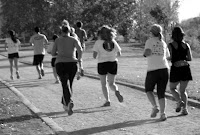 2009 was a good year for fast Bakersfield marathon running and reminded me of the late 70s and early 80s. Back then, Bakersfield had at least a dozen runners going sub three for the 26.2 miles Of course, back then the marathon was ruled by the thirty and forty year olds but in 2009 youth was served.
2009 was a good year for fast Bakersfield marathon running and reminded me of the late 70s and early 80s. Back then, Bakersfield had at least a dozen runners going sub three for the 26.2 miles Of course, back then the marathon was ruled by the thirty and forty year olds but in 2009 youth was served.My son, Christopher (16) started off the year with a debut 3:16 (he cruised and could of went a lot faster) marathon in February at the Surf City Marathon. Then in May, David Bacus (24) came in 4th overall at the O.C. Marathon in a time of 2:52! But the huge surprise was Zach Holt's 14th place at the San Francisco Marathon where he ran 2:45 for his first marathon!
Now I did not have a hand in Bacus's performance but I coached Christopher and Zach for their debut marathons and would like to coach you. Now you might not run as fast as they did, but my program will help you finish a marathon and have a positive experience. To properly train for a marathon, one needs four to six months of specific training and the time is now to think about next spring's marathons.
With this in mind, please take the time to check out my running camp.
What do I receive with my Building Better Bodies Running Camp courses?
Expert Coaching, Training Schedule, Text and/or Email Support, Group Support, Informative Training Clinics, a Building Better Bodies Training Shirt , and a stronger, fitter, faster you !!! More Information HERE.
What is the cost ?
Each 8 week session will only run you $100. The 16 week marathon training session is $190. Each race you enter and are photographed sporting your Building Better Bodies T-shirt will get you a $5 credit towards your next Run Camp, Boot Camp, or Circuit Class.
Since I cover most of the races in town, you should be able to receive this discount easily. Plus I have over 60,000 photos at AndyNoise.SmugMug.Com and my prices are very reasonable.
Please download the waiver/registration form HERE and print it out. Please bring the completed waiver/registration form to your first Bakersfield Running Camp Session. You may pay with a check made payable to Building Better Bodies or online via Pay Pal.










